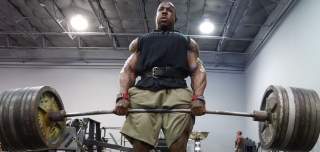Do you feel tired all the time? Are your joints sore? Do you feel weaker than normal? Have you stopped making progress in the gym? Have you lost your training mojo? According to popular gym lore, you may be overtrained.
Overtraining is a controversial exercise subject; some people are adamant it doesn’t exist at all, and it’s merely an excuse used by the weak and lazy to skip workouts.
In contrast, other people are so worried about the risk of overtraining that they train very conservatively, plan regular back off weeks to promote recovery, and plan their supplement stacks to minimize the risk of developing this problem.
So – who is right? Is overtraining a figment of the imagination of weak and lazy people, or is it something to worry about? The answer is somewhere between these two points of view.
Overtraining does exist. It’s characterised by several symptoms including:
-
General fatigue
-
Non-specific joint pain
-
Loss of enthusiasm for training
-
Declining performance
-
Moodiness
-
Insomnia
-
Loss of appetite
-
Unexplained stomach upsets
-
Elevated cortisol levels
-
Decreased testosterone and growth hormone levels
-
Fat gain – especially around the waist and back
Overtraining can be summed up like this: A physiological state caused by an excess accumulation of physiological, psychological, emotional, environmental, and chemical stress that leads to a sustained decrease in physical and mental performance, and that requires a relatively long recovery period – usually several months.
Overtraining is real, but it’s also relatively rare. Most gym goers do not train hard enough, long enough, or frequently enough to suffer “true” overtraining. Overtraining happens to Olympic-level athletes who are training 20-30 hours a week without breaks and who are under the added pressure of representing their countries in the biggest competition of their lives. It’s not usually an issue that should concern the average rat who trains 4-6 hours per week.
What people often called overtraining is, in fact, overtaxing.
Overtaxing is similar to overtraining but not as severe. It’s usually the result of training hard but not paying attention to the importance of recovery. It might also be caused by training the same muscle group too often or simply doing the same workouts over and over again.
For example, if you normally do five sets of squats a week but then you decide to quadruple that to 20 sets, your legs are going to feel hammered. Your knees and hips will feel sore, you’ll probably be too stiff to walk properly, and you may even develop some light flu-like symptoms. In this instance, you are not overtrained, but you have definitely overtaxed yourself. A few days’ rest and you’ll be right as rain again. While quadrupling your workout volume is not smart, it’s not terminal either. You can think of this as a workout hangover.
Many exercisers are overtaxed and suffer these workout hangovers frequently. In many cases, this is because they are “stimulus junkies” who train longer or harder than is necessary.
For example, if 12 sets per body part trigger an adaptive process, doing 20 sets simply digs deeper and deeper into your ability to recover and can lead to overtaxing. More exercise is not necessarily better.
There is nothing wrong with training hard but, doing more than is necessary merely delays recovery, leads to overtaxing, and can give you the workout hangover feeling that many people improperly label as overtraining.
The good news is that overtaxing is easily fixed – a week of less intense training will soon restore your energy levels. That’s why many of us feel great after an enforced week layoff like a vacation. If you were suffering true overtraining, your recovery could last months and, even then, you may never regain your full fitness or the desire to train.
You probably don’t have to worry too much about true overtraining, but overtaxing is a real problem for many exercisers. Avoid the workout hangover by following these simple guidelines:
-
Do not exercise every day – have at least two days a week off training. It’s okay to be physically active but avoid formalised exercise
-
Follow a periodised approach to both training volume and intensity – build up to short periods of very hard training and then back off for a while to allow recovery
-
Increase exercise volume and intensity gradually and not overnight
-
Vary your exercise selection from time to time
-
Always consume fast acting carbs and protein immediately after exercise
-
Focus on food quality as much as you focus on quantity – you cannot out-supplement a bad diet
-
Get at least seven hours of sleep per night
-
Training instinctively – if you feel tired, it’s okay to have an easy workout
-
Try to see how little exercise you can do to get the results you want – not how much you can tolerate. Think quality and not quantity
-
Take short, planned breaks from training – especially after a hard few weeks or competition
-
Reduce training volume and intensity if you are following a very low-calorie diet
-
Back off or take a break from training if you feel unwell – your body is already overtaxed trying to cope with whatever ails you
-
Don’t rely on pre-workout supplements all the time – they can disguise feelings of fatigue that, if ignored, could lead to “real” overtraining. With adequate rest and proper nutrition, you should have all the energy you need for training
In conclusion, overtraining is real, but it’s also virtually unheard of in recreational exercisers. However, many gym goers are overtaxed because they do not pay enough attention to recovery. Get your recovery strategies in order, and you should be able to avoid overtaxing and workout hangovers.












2 Comments
Comments are closed.